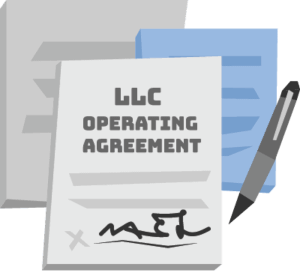How to Create a Manager-Managed LLC Operating Agreement
Unsure if you have the right form? If LLC members authorize one or more managers to make decisions on behalf of the business, the business is a manager-managed LLC—and you’re in the right place. Like all our forms, our manager-managed LLC operating agreement is for individual use.
Have a different kind of LLC? We offer other free operating agreements as well. Only one member in your LLC? You need a single member LLC operating agreement. Have multiple owners who all run the business? You need a multi-member LLC operating agreement.

What’s Included in a Member-Managed LLC Operating Agreement
A manager-managed operating agreement needs to spell out both the powers and duties of managers as well as provide guidelines for members’ needs, such as transferring membership interest. There’s a lot of ground to cover. Our free template includes the following critical sections:
Article I: Company Formation
This first section of the LLC operating agreement essentially does four things:
- Affirms that the LLC has been formed by state laws and will conduct lawful business
- Notes where key business information (such as member info and registered agent) can be found
- Lists the events that can end the business (and how members can continue the LLC)
- Explains how to add new members
Article II: Capital Contributions
One of the first steps of starting an LLC is funding the business with initial capital contributions. Each member contributes money or other assets in exchange for ownership interest. You’ll list the value of these contributions in this section. This section also notes that additional contributions aren’t required.
Article III: Profits, Losses and Distributions
In a manager-managed LLC, members don’t run the business—members are basically investors, so they’ll be very interested in exactly how and when they’ll see some money. This section states that profits and losses are to be determined annually and allocated to members in proportion to their percentage of ownership interest. After expenses and liabilities are paid, distributions can be made annually as well (or more often). If the company or membership interest is liquidated, distributions follow Treasury Regulations.
Article IV: Management
The bulk of this section spells out how managers are chosen and what their responsibilities and duties are. Essentially, this article notes that members vote on one or more managers, as well as electing one Chief Executive Manager.
After that, members leave management, control, and operations to the managers. This article assigns responsibilities to managers, including making decisions, executing contracts and agreements, keeping records, and responding to member requests for information. The CEM is responsible for primary operations and for carrying out decisions of other managers.
This article also notes that managers aren’t liable for losses or damages to the LLC resulting from decisions and actions made in good faith. In the case of lawsuits or other actions, the LLC covers losses from expenses or judgments for those acting in good faith for the best interest of the LLC.
Article V: Compensation
This section notes that managers are entitled to compensation for their services. Members or managers must be reimbursed for LLC expenses paid out-of-pocket.
Article VI: Bookkeeping
Managers are running the show, so they’re responsible for keeping financial records. This section gives specifics on keeping books, noting that managers should keep separate capital and distribution accounts for each member and keep books on a calendar year. At the end of the year, managers close the books prepare a statement for each member.
Article VII: Transfers
Members need clear guidelines on how they can leave the LLC and transfer their membership interest to someone else. This section goes over these details, giving other members first shot at purchase and noting that members must unanimously approve a sale for the recipient to get any voting rights. If there’s no buyer, the LLC can assign the interest to current members.
This section also aims to maintain fair valuation of membership interest. Sellers clearly want high valuations and buyers want low valuations, so this article ensures that both sides have input and can defer to a third-party appraiser in case of dispute.
Article VIII: Dissolution
Members can choose to end the LLC through the process of dissolution. This section notes that if the company is dissolved, the LLC is responsible for paying debts before making any distributions to members.
Certification of Members
This is the signature page. Each member signs, acknowledging that they agree to abide by the terms of the agreement.
Exhibits
Exhibits are fill-in-the-blank forms at the end of the operating agreement. These forms include places for you to list individual manager information, member information and capital contributions.
Start Your LLC Today!


Why should my LLC be member-managed?
The biggest benefit of having a manager-managed LLC is an added layer of privacy. On your public documents in most states, you will need to state whether you are “member-managed” or “manager-managed” and list either your members or managers. So, with a manager-managed LLC, the odds are that you won’t have to publicly disclose your members on public business documents.
And, while LLC members can be managers, they don’t have to be. A manager can be someone hired from outside of the business. You could even list another LLC as the manager to further keep your information off public records.
At Northwest, we know the ins and outs of starting and maintaining businesses. Besides offering loads of useful forms, we provide LLC registered agent service in every state. We have online tools to help keep your LLC in compliance. We also form LLCs for $39 plus state fees.


Manager-Managed vs. Multi-Member LLCs
The biggest difference is that your manager-managed LLC operating agreement has some added complexity. The operating agreement not only gives authority to the managers, but it also gives the members strict guidelines as to how the membership percentages will be given, what happens if the LLC breaks up, and how the members could buy each other out.
Manager-Managed LLC Operating Agreement






